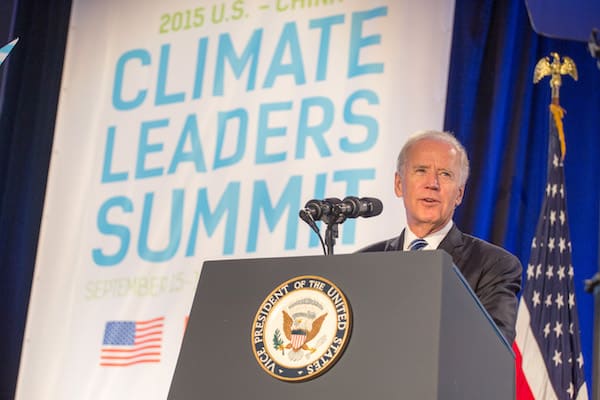
Minnie Che is a student at Harvard Law School.
On Wednesday, President Biden signed a series of executive orders that will suspend new oil and gas leases on federal land with a goal of elevating the priority of climate change to every level of federal government, including foreign policy and national security policies. The orders direct the secretary of the Interior Department “to pause on entering into new oil and natural gas leases on public lands and offshore waters to the extent possible” and review existing fossil fuel leases and permitting processes. This is the first step in Biden’s campaign pledge to stop drilling on federal territory. In addition to eliminating fossil fuel subsidies, federal agencies will also “identify new opportunities to spur innovation.” The oil, coal, and gas industries will no longer enjoy billions of dollars in tax breaks. Instead, those funds will go towards fulfilling Biden’s $2 trillion climate change plan. Gene Karpinski, president of the League of Conservation Voters, said of the orders, “This is the single biggest day for climate action in more than a decade.”
The five biggest U.S. banks, JPMorgan Chase, Bank of America, Citigroup, Wells Fargo, and U.S. Bancorp, have all publicly committed to mandating diverse applicants when making hiring decisions. In an industry still dominated largely by white males, this action is in response to a proposal sent by the AFL-CIO in its capacity as a shareholder through its reserve fund. These policies parallel the Rooney Rule, which originated in the NFL as a way to ensure that people of color were considered for coaching jobs. Since its inception, the rule has gained popularity in corporate America and boards of directors. While the banks state that they already have diversity policies in place, the public commitment allows them to be held accountable to their hiring practices. Brandon Rees, deputy director of corporations and capital markets at AFL-CIO, said, “There’s been diversity at lower levels of the financial services industry, but you have something of a glass ceiling when it comes to senior management.”
Citigroup has pledged in 2021 to require interviews from at least two diverse candidates at the assistant vice president level and above. Wells Fargo has said it will disclose details about its hiring policy that requires at least 50% of candidates being interviewed be women and other minority groups for jobs with salaries more than $100,000. JPMorgan has agreed to publish its own policy where one woman and one person of color is considered for every position. U.S. Bancorp and Bank of America plan to expand their current policies, which are similar to JPMorgan’s.
In a New York Times opinion piece, Silicon Valley workers have escalated engagements in collective action in recent years, a historically uncommon practice for white-collar workers in tech. This year saw growing public concern about the power of media platforms and the destructive impact of misinformation campaigns. Employees on Twitter and Facebook demanded for Trump’s suspension from the platforms, while Amazon cut ties with Parler, a tech platform popular with the far right, hours after Amazon employees called for the action. After the 2016 election, tech employees signed a pledge refusing to build a database of people based on their constitutionally-protected religious beliefs. Since, these white-collar workers have waged collective action campaigns around issues such as the weaponization of AI and the carbon footprint of the tech industry. In February 2020, employees at Kickstarter voted to unionize, while this month, Alphabet, Google’s parent company, announced the Alphabet Workers Union. Tech workers are not just unionizing for compensation and social action, but also for a workplace free of racism and sexism, which remains prevalent in the industry.
Fiat Chrysler Automobiles NV’s U.S. division, which has been the center of a long-running government investigation into union corruption among Detroit’s top labor leaders, has agreed to plead guilty to a criminal charge and pay $30 million for violating labor laws. Fiat Chrysler also agreed to oversight of the closing of a worker training center by an independent compliance monitor for three years. The facility was a focus of the federal investigation.





Daily News & Commentary
Start your day with our roundup of the latest labor developments. See all
April 19
Alabama and Louisiana advance anti-worker legislation; Mercedes workers in Alabama set election date; VW Chattanooga election concludes today.
April 18
Disneyland performers file petition for unionization and union elections begin at Volkswagen plant in Tennessee.
April 18
In today’s Tech@Work, a regulation-of-algorithms-in-hiring blitz: Mass. AG issues advisory clarifying how state laws apply to AI decisionmaking tools; and British union TUC launches campaign for new law to regulate the use of AI at work.
April 17
Southern governors oppose UAW organizing in their states; Florida bans local heat protections for workers; Google employees occupy company offices to protest contracts with the Israeli government
April 16
EEOC publishes final regulation implementing the Pregnant Workers Fairness Act, Volkswagen workers in Tennessee gear up for a union election, and the First Circuit revives the Whole Foods case over BLM masks.
April 15
The Supreme Court ruled in favor of bakery delivery drivers in an exemption from mandatory arbitration case; A Teamsters Local ends its 18-month strike by accepting settlement payments and agreeing to dissolve